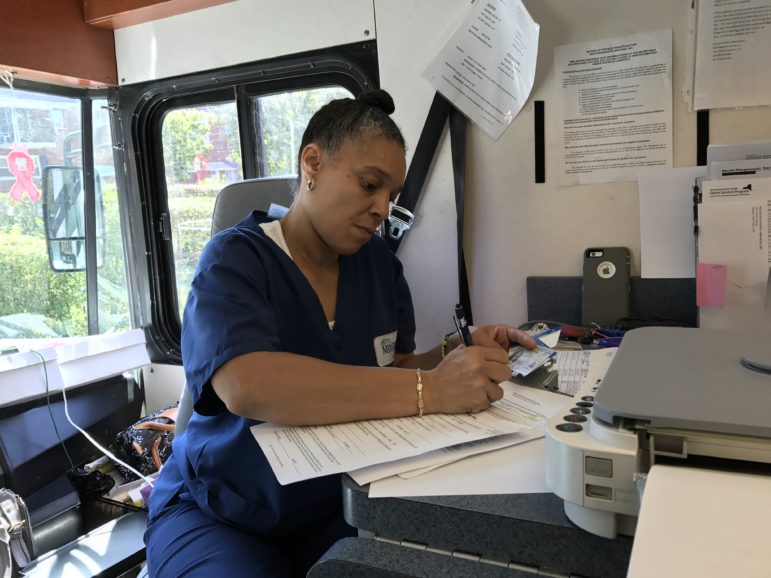
Alexandra Semenova
Maria Velez, 44, an intake and driver for the American-Italian Cancer Foundation’s mobile breast cancer screening facility, writes patient names into a log.
Maria Velez, 44, a driver and intake specialist for the American-Italian Cancer Foundation, a partner of the Church of Abiding Presence, helped two Latino women fill out forms for a breast-cancer screening in a mobile clinic parked in front of the church.
The women were Catholic. Neither of them was a member of the Evangelical Lutheran congregation facilitating the service. But they heard from neighborhood residents the church offers screenings free of cost and came for their first checkup.
The church is both a place of worship and a community center that draws people of different religions and cultures in by providing resources that are inaccessible to them in traditional clinical facilities because they are uninsured, underinsured or stymied by language and educational barriers.
The Church of Abiding Presence, located on the corner of Fteley Avenue and 172nd Street in the Soundview section of the Bronx, has a mission: to help low-income and marginalized residents, regardless of faith, get access to healthcare and clinical resources.
Bronx County has the worst health outcomes in the state, according to the most recent report by the Robert Wood Johnson Foundation and the University of Wisconsin’s Population Health Institute, which tracks clinical care and quality of life. The region also ranked second-to-last in clinical care, the report showed.
Understanding New York’s Public Hospitals Crisis
Where did it come from? Is there a way out?
Read more.
* * * *
In the back of the church, Ruby Garner arranged pamphlets on a table covered in plastic red cloth. Some of them addressed some of the health issues that most severely affect the Bronx. One pamphlet offered tips on how to quit smoking. Another listed warning signs of a mental health issue. Others had information on diseases, including HIV and Alzheimer’s.
Garner, a 43-year-old church member and the coordinator of health ed at the South Bronx-based nonprofit agency Health People, was preparing for a health fair at the church as gospel music played in the background.
“In the Bible, it says to go out, be fruitful and multiply,” Garner said. “They don’t mean just to have babies, or whatever. It means go out, whatever knowledge you have, there may be someone who needs your help.”
Garner helps organize partnerships between health organizations and the church to provide care to the medically underserved neighborhood.
“If we were getting enough from our community, there wouldn’t be so many homeless people sleeping outside,” Garner added. “There wouldn’t be so many people picking up bottles, trying to survive.”
Garner said the biggest barriers between South Bronx locals and proper medical care are education and language. The church aims to help people who do not speak English. Many of those who come to the house of worship seeking clinical resources only speak Spanish. Of the 187,000 residents in Castle Hill, well over half are Latino, and 31.3 percent of that population lives below the poverty level, according to data from the U.S. Census Bureau.
“We are serving mankind and that is our mission,” said the church council president, Cindis Buggs, 83. “I practice the Christian religion, and Christianity has taught to love, to look out for others, and to be of service.”
Buggs helps host health fairs, food pantries and disease screening events at the church. All are open to the entire community.
“There is absolutely no discrimination from where an individual comes to our church,” Buggs added. “Whatever religion you choose, come—we accept.”
Back in the mobile clinic parked in the front, Velez escorted the two Latino women to the mammography machine in the back of the vehicle after they finished signing their forms.
“Women around this neighborhood see the bus and they want to come in,” Velez said. “We have women of all religions coming; there’s no segregation here.”









One thought on “Hearing the Call to Help, Closing the Gap on Health”
Pingback: Church’s Mission Extends to Healthcare – New York City News Service